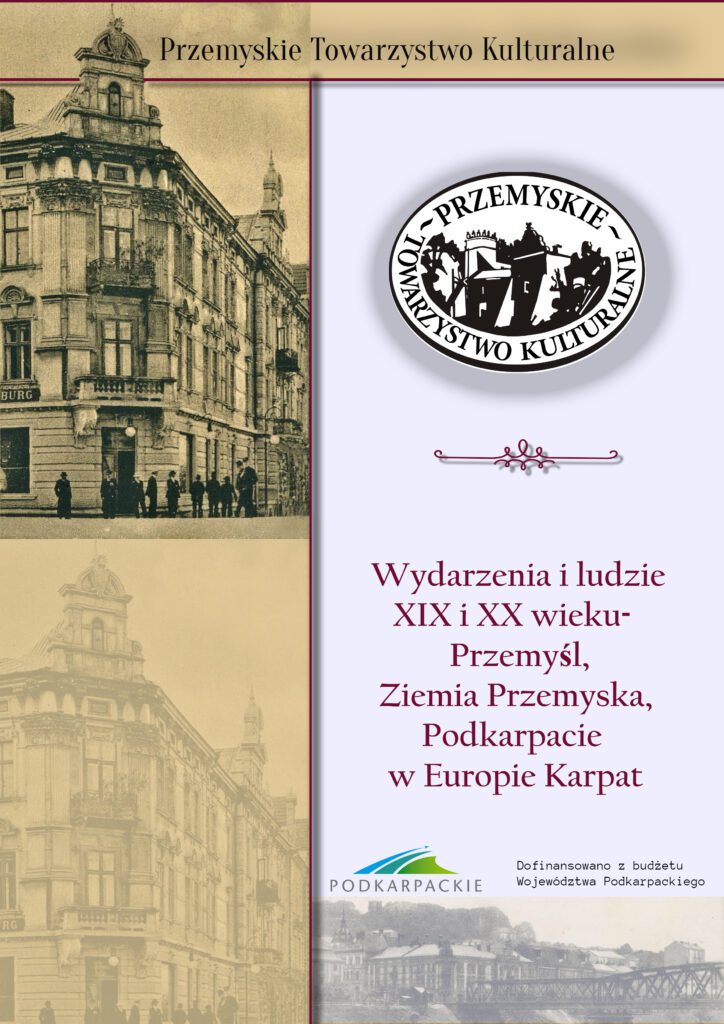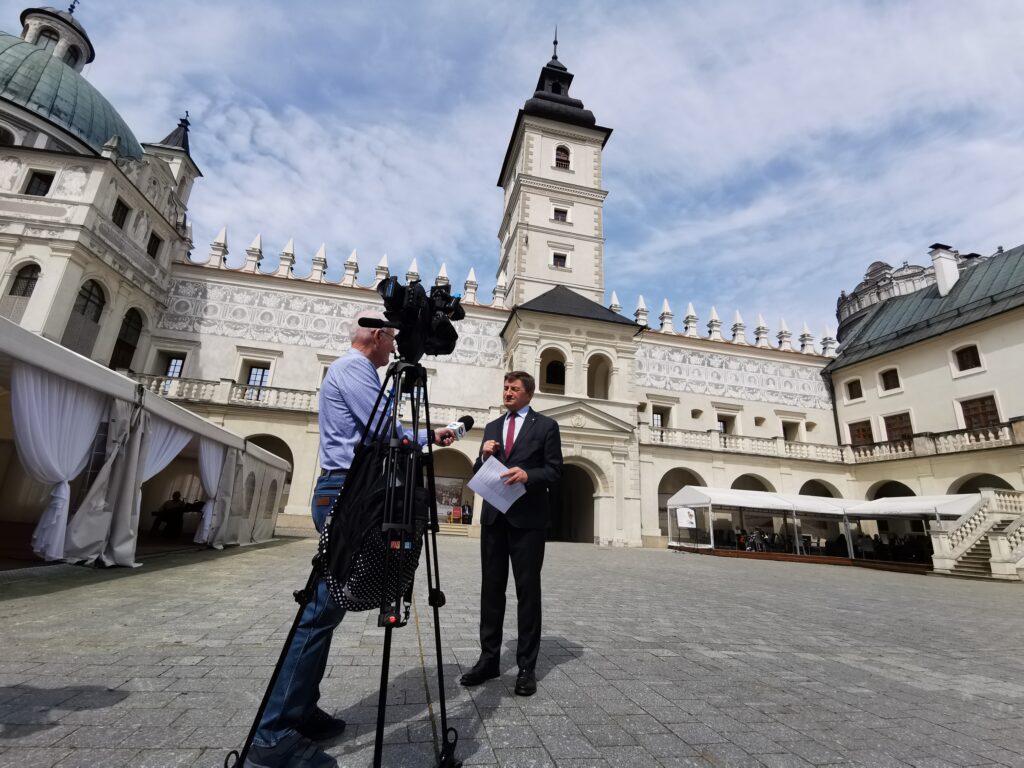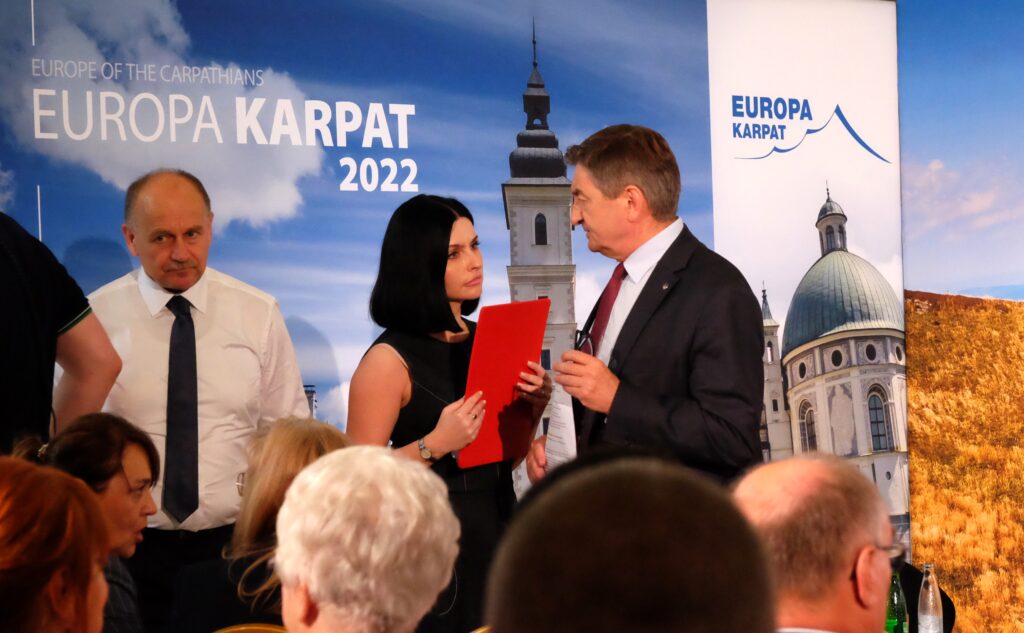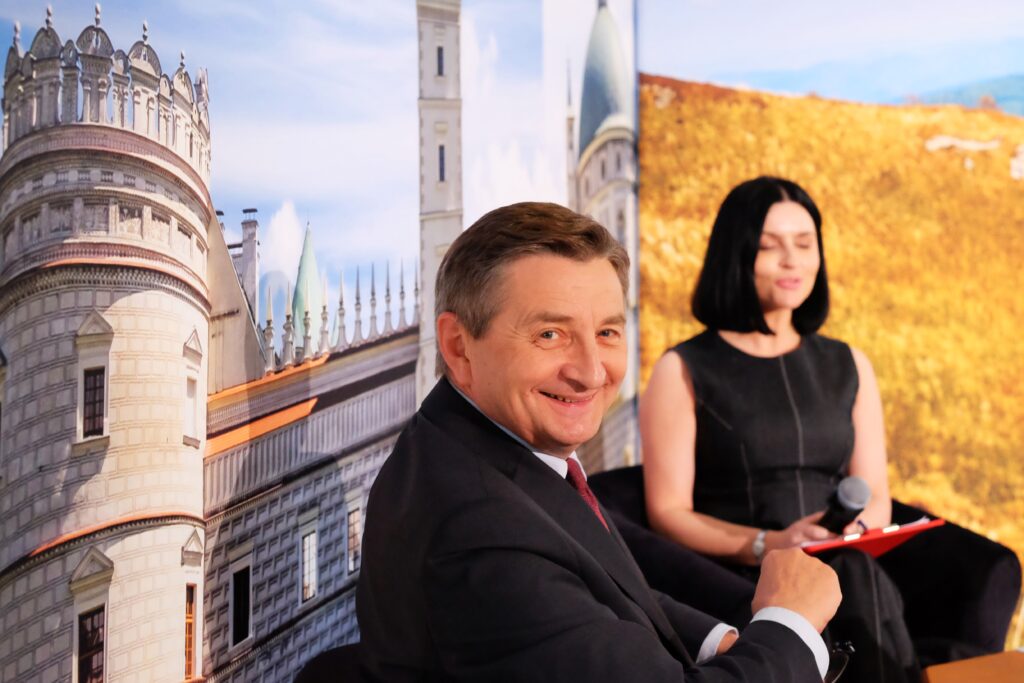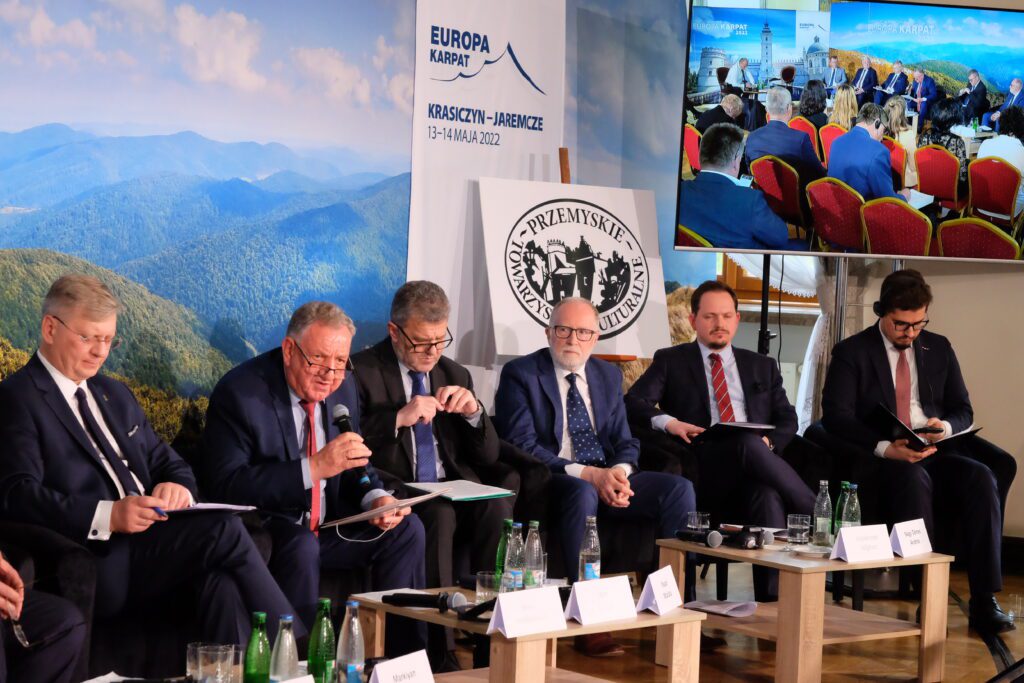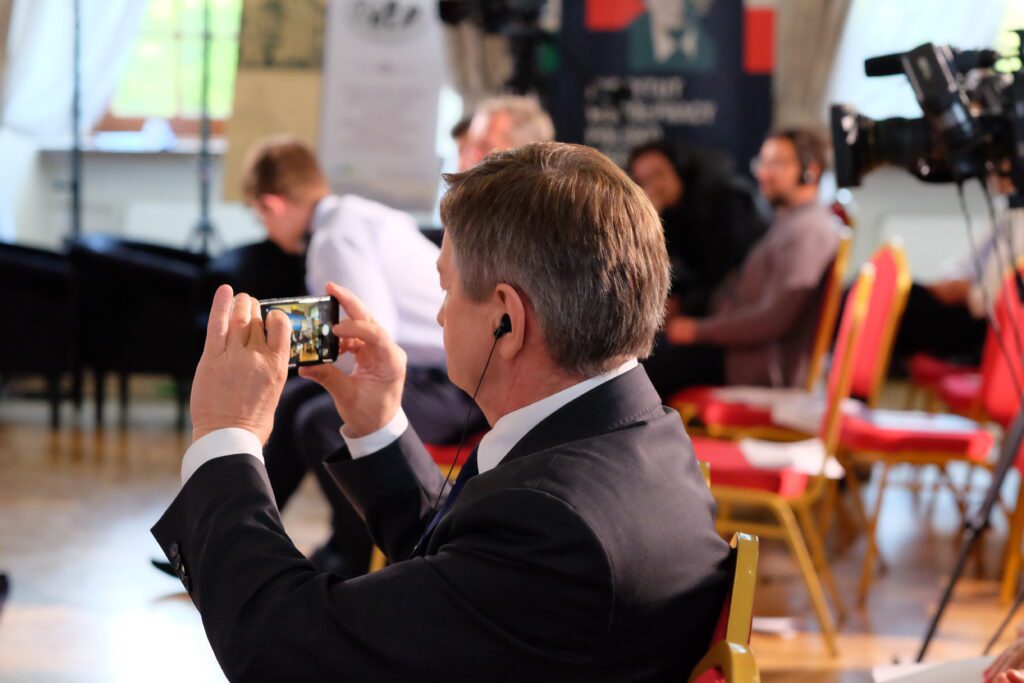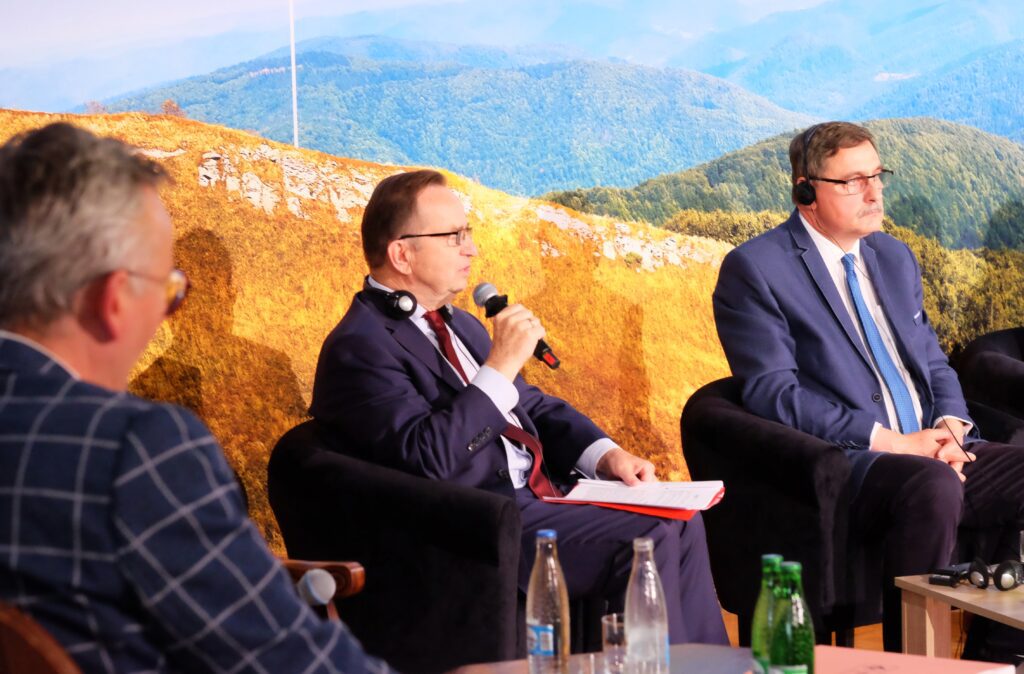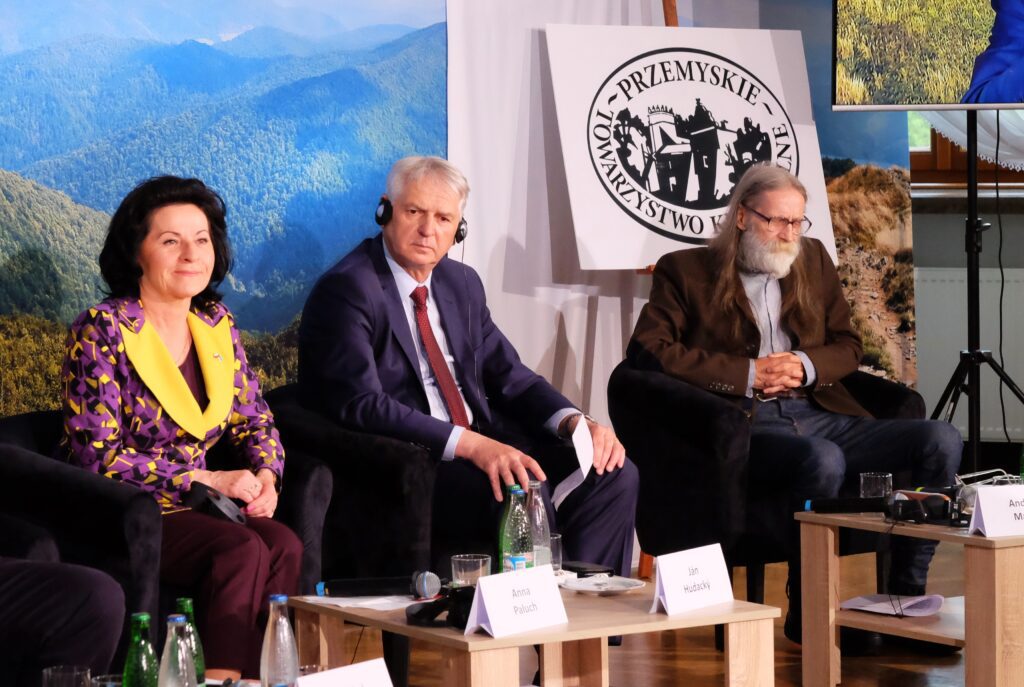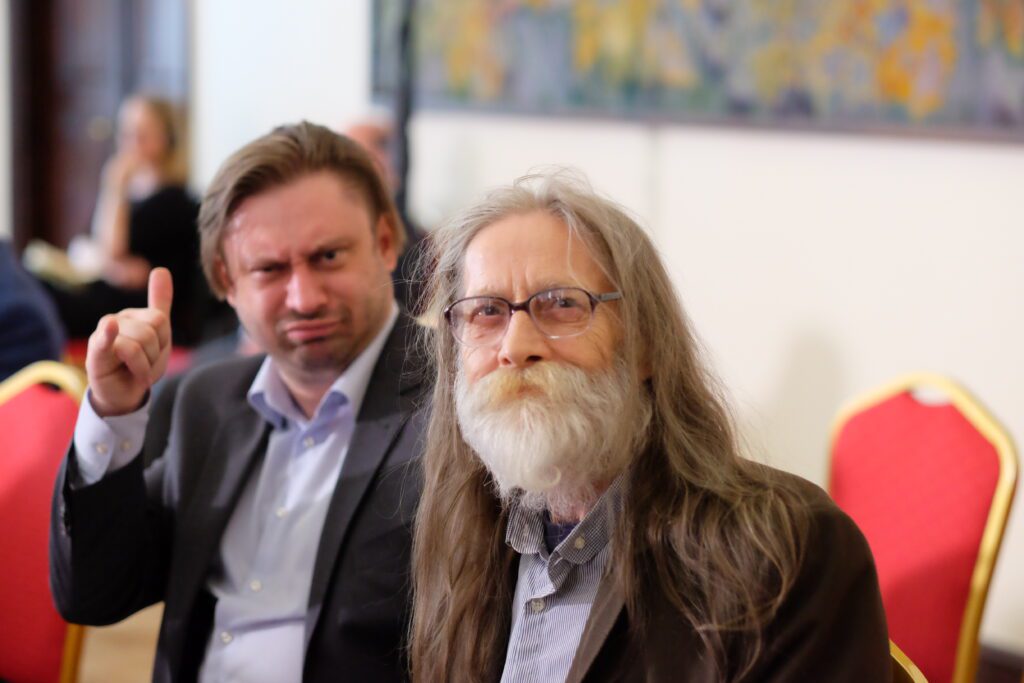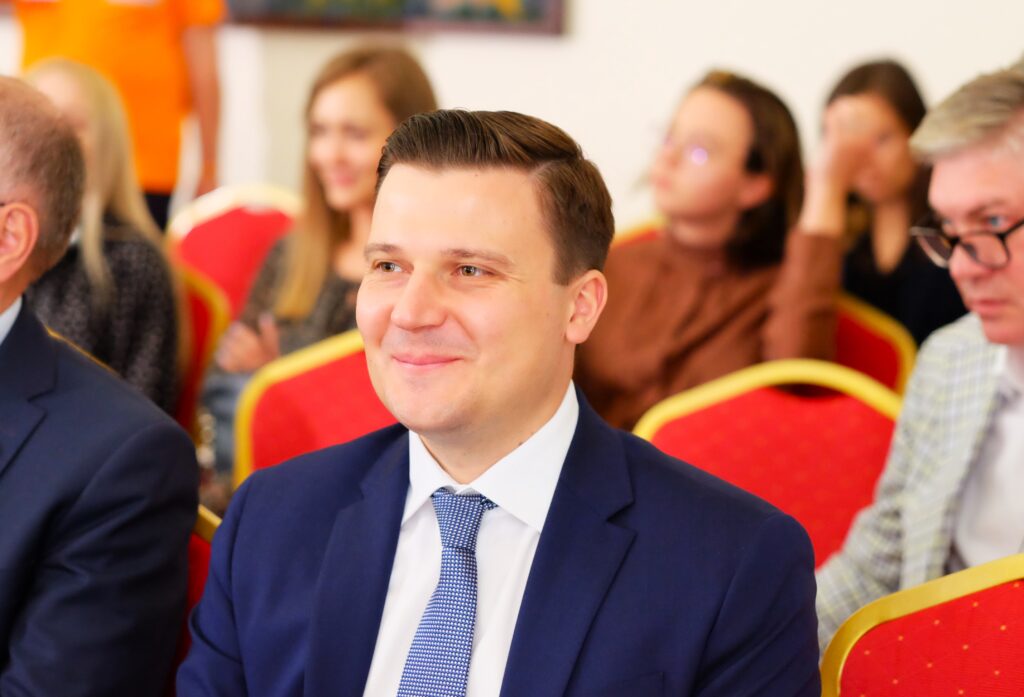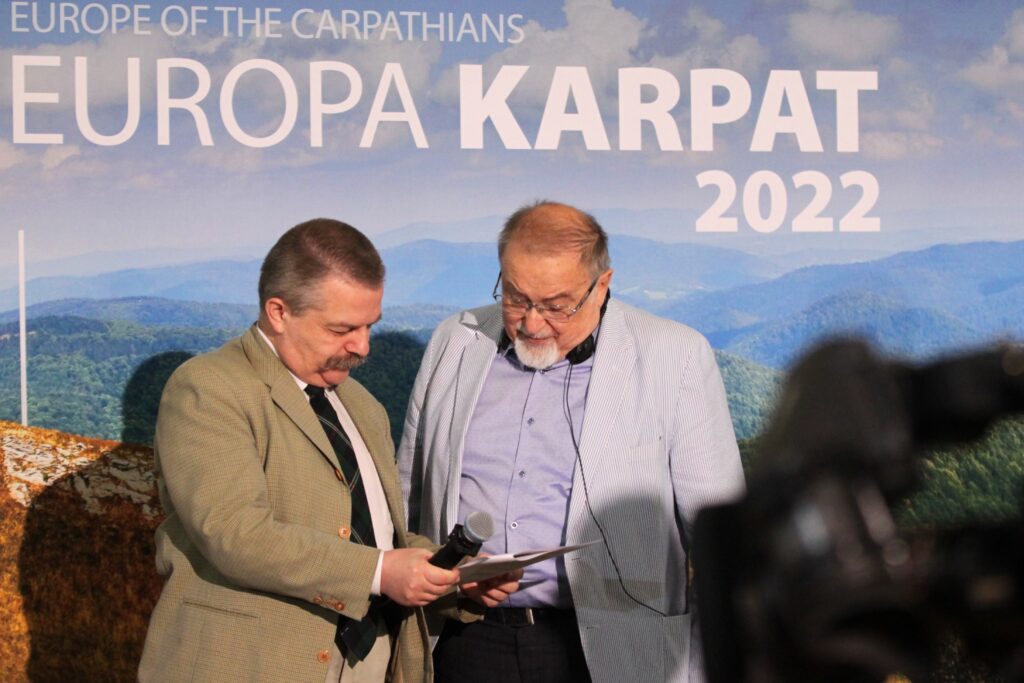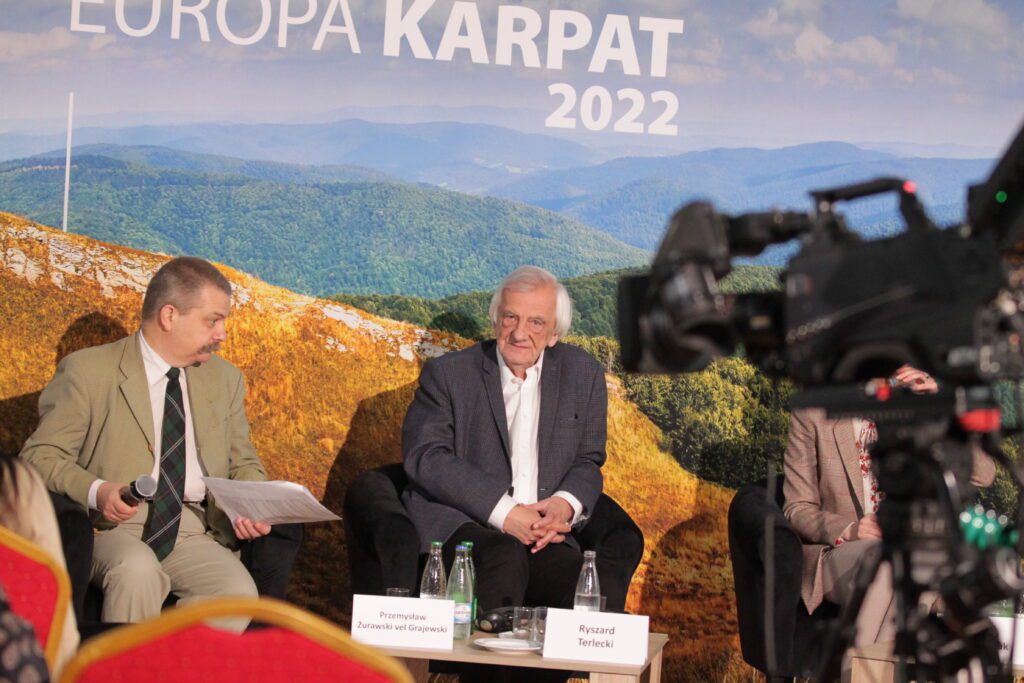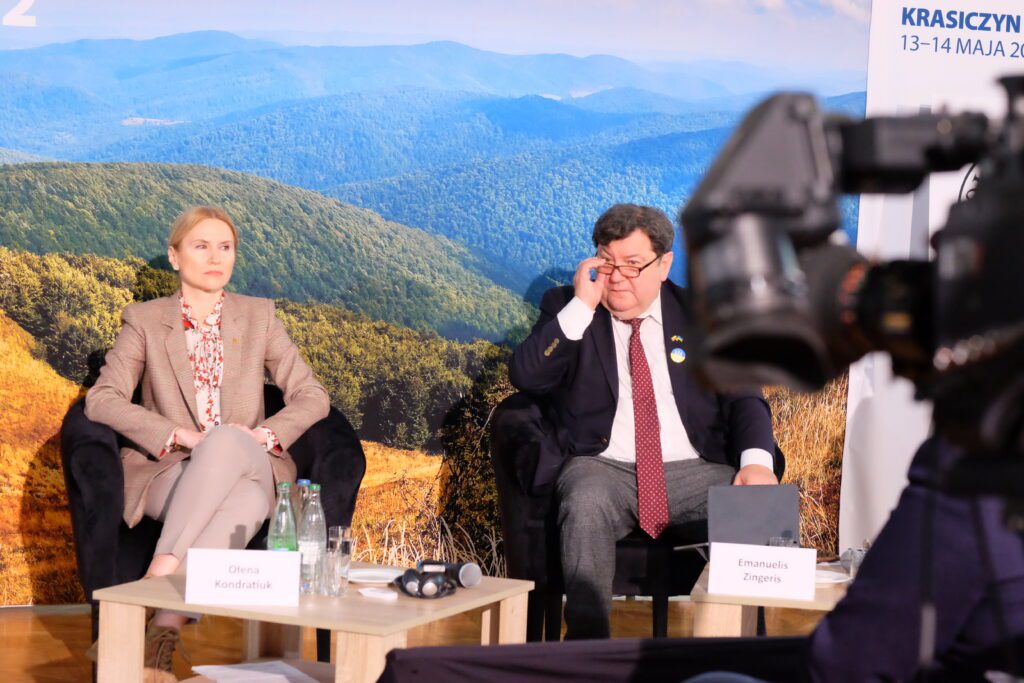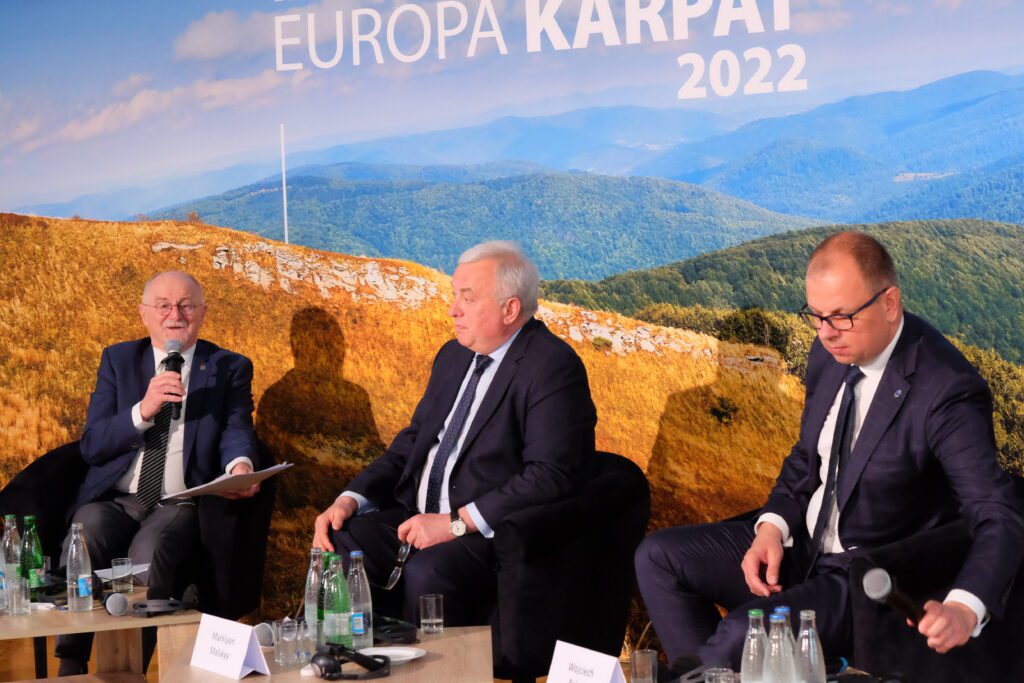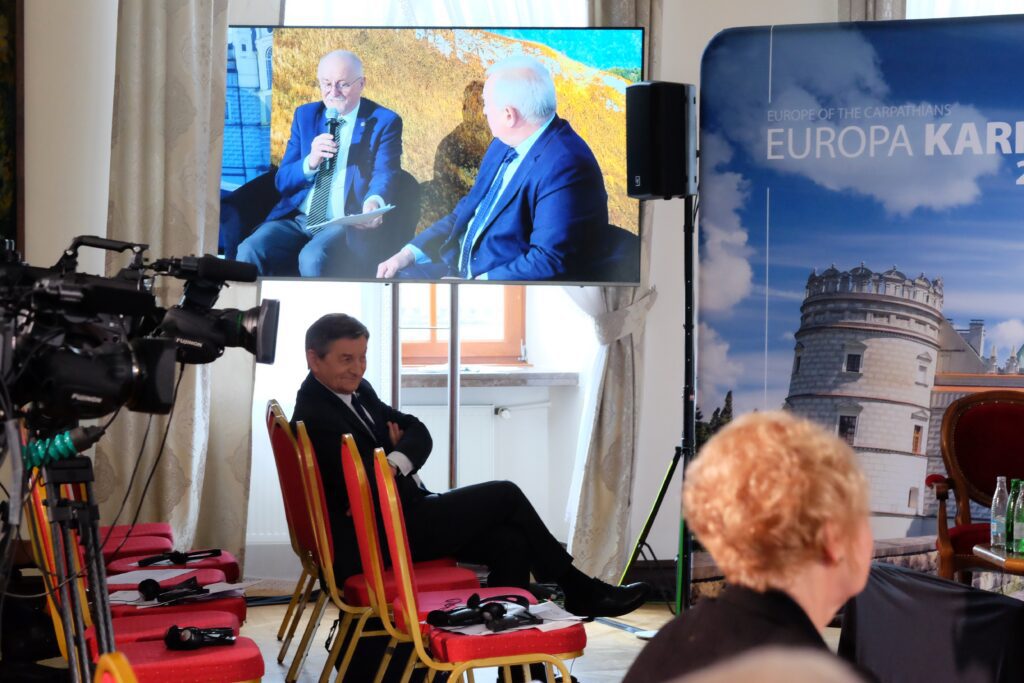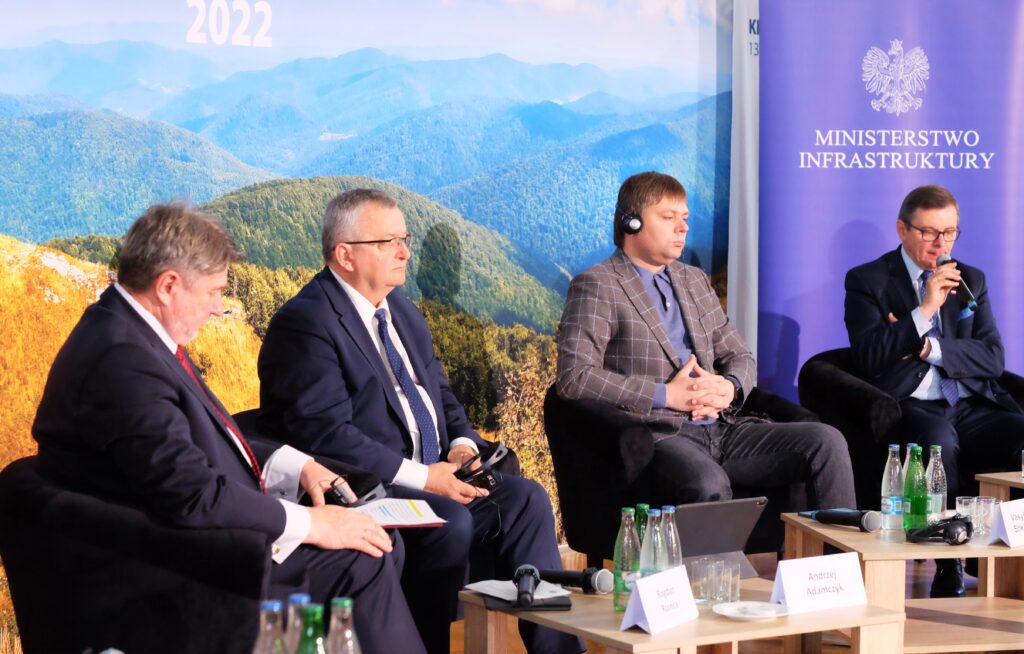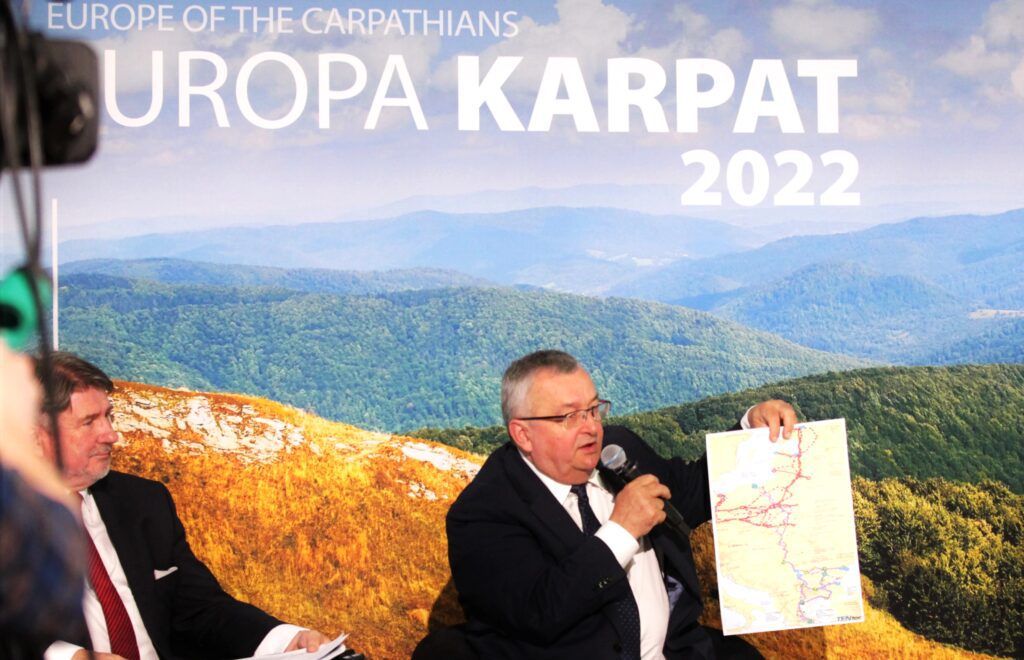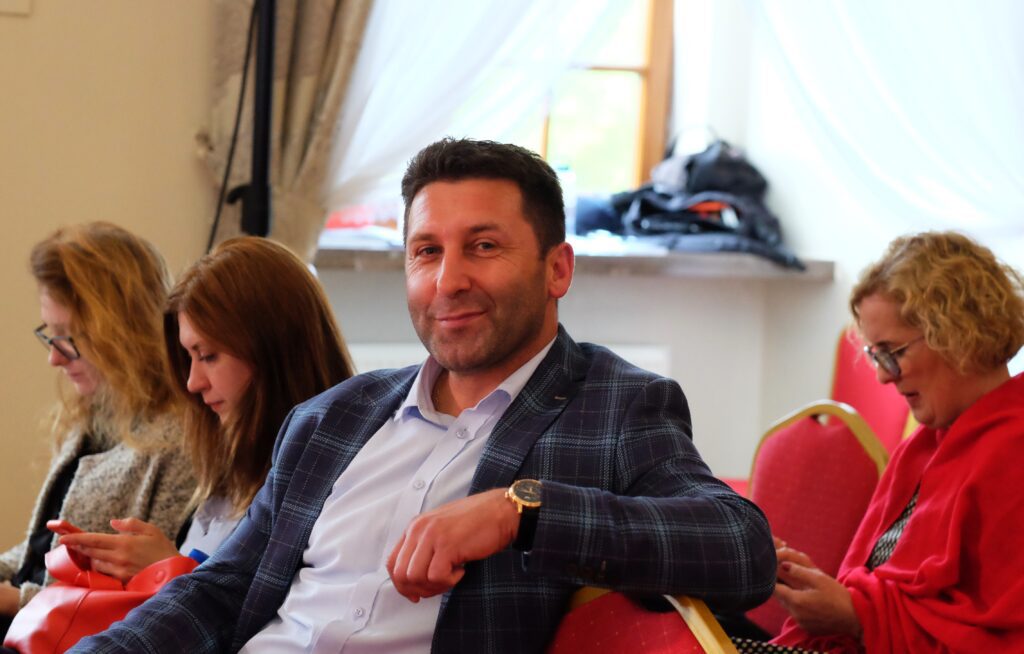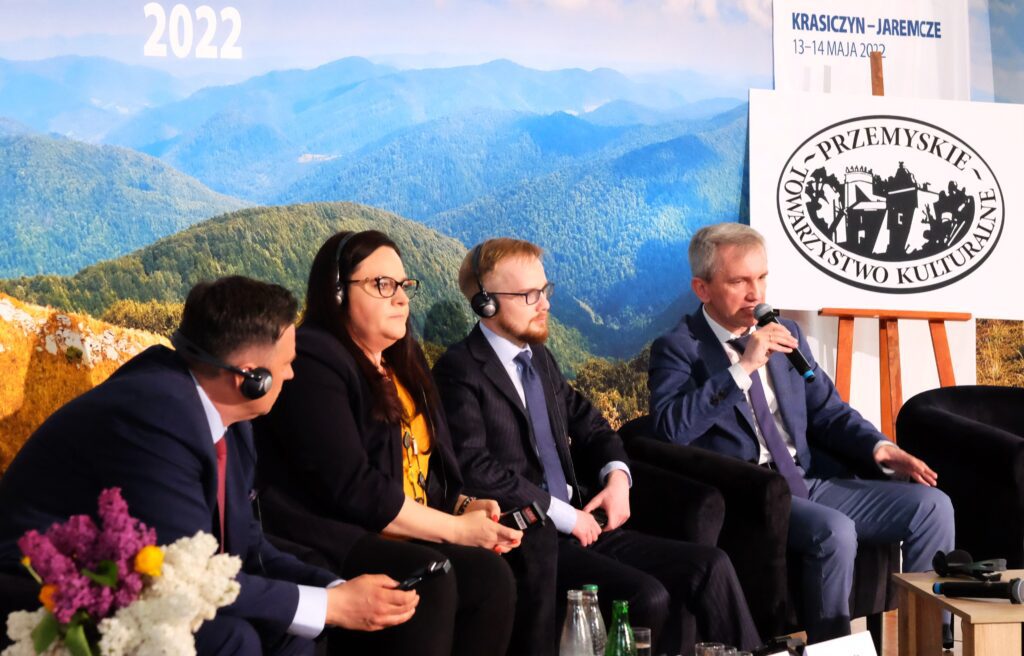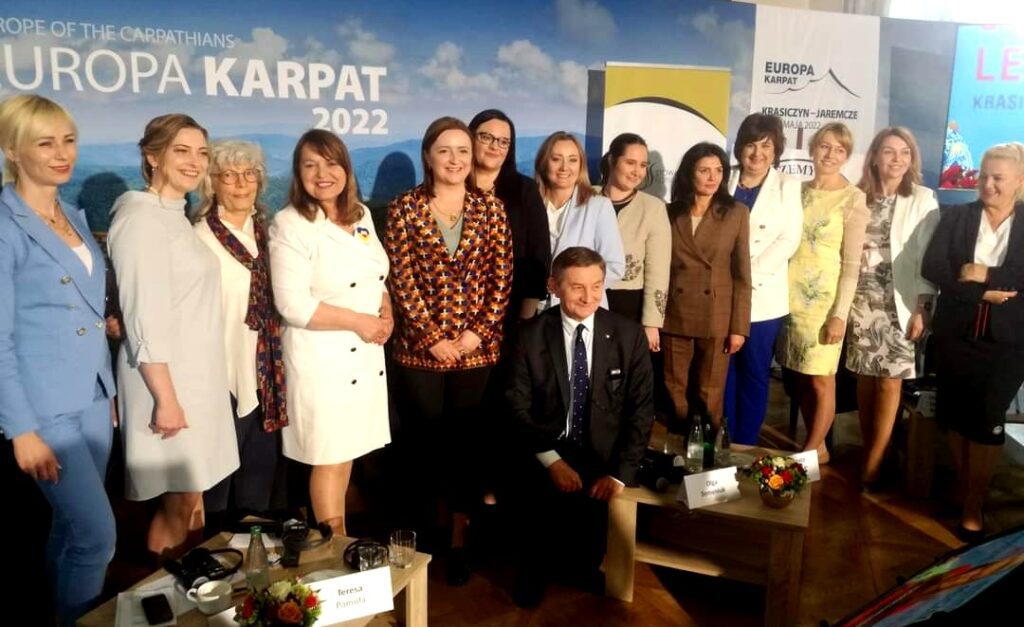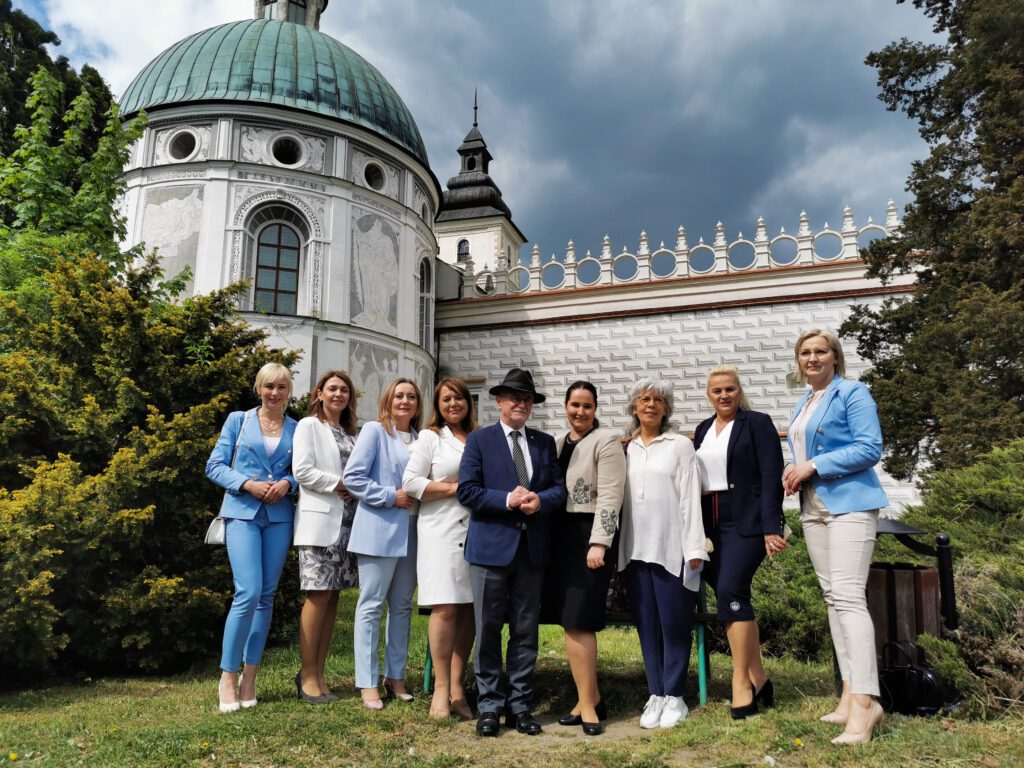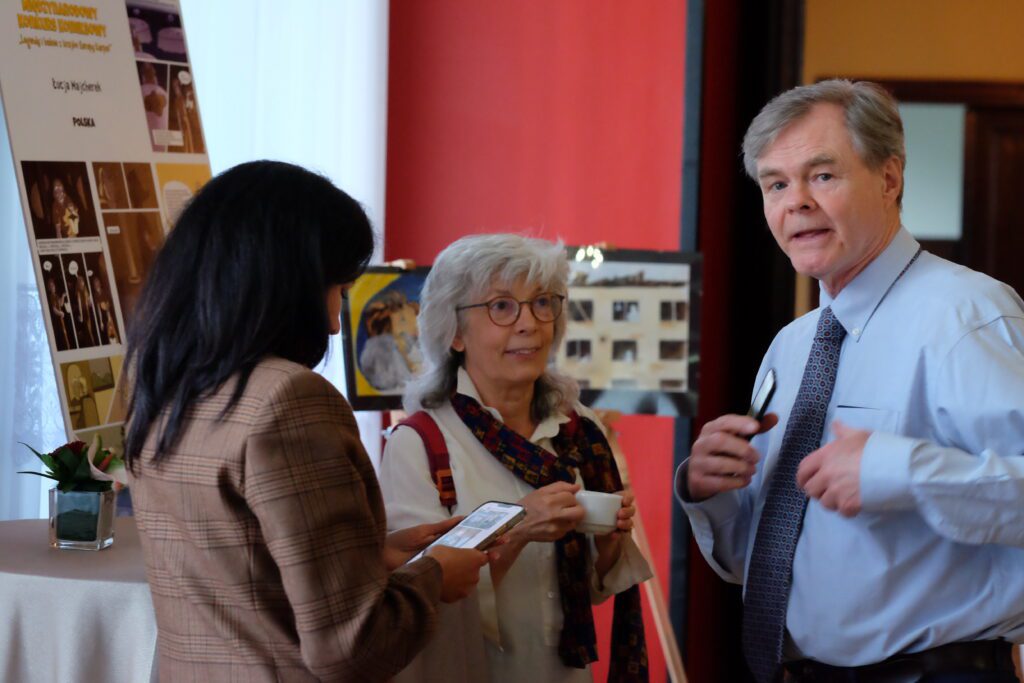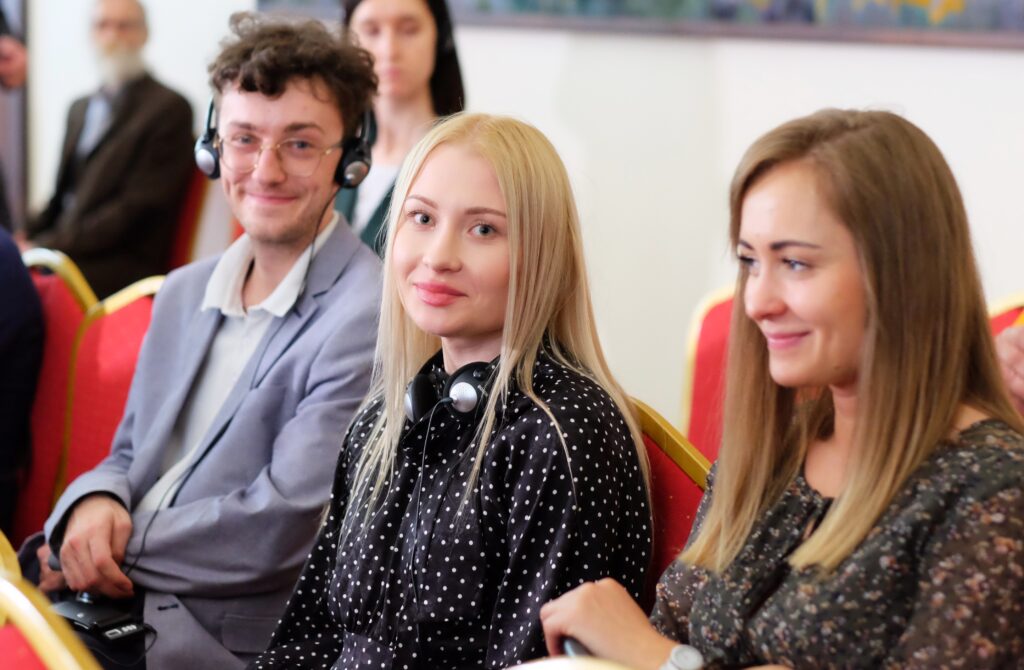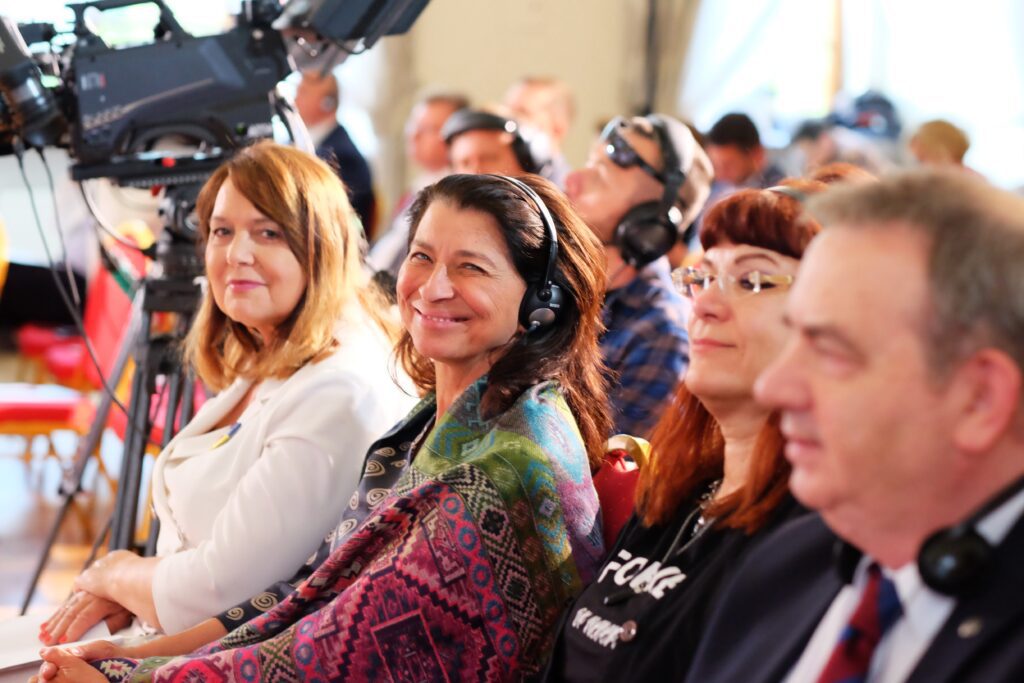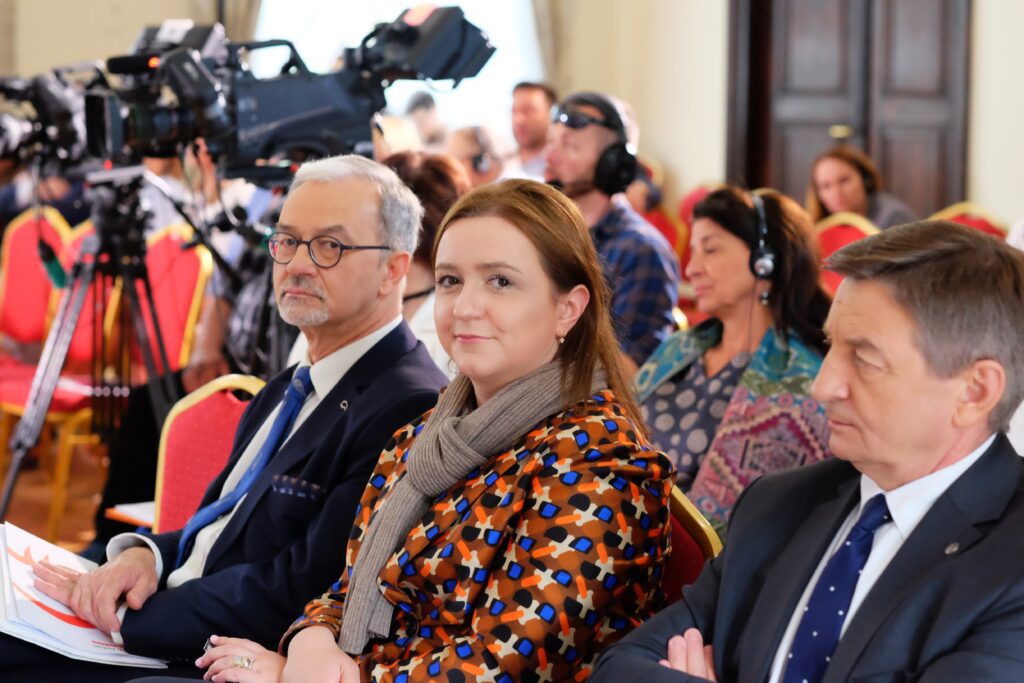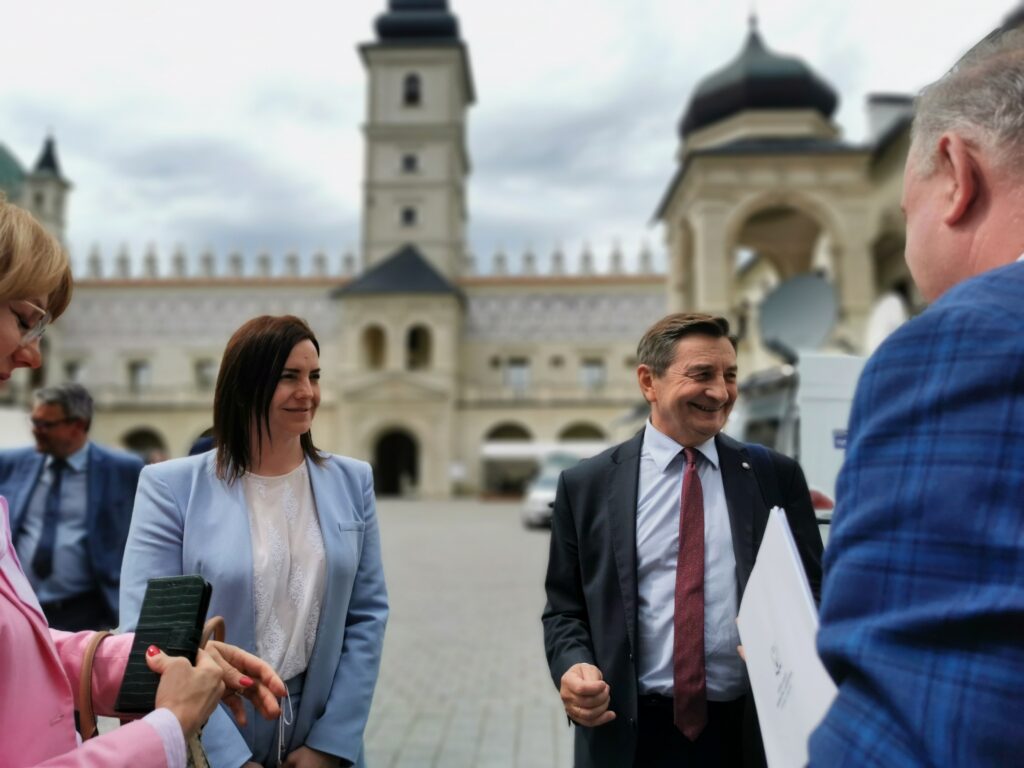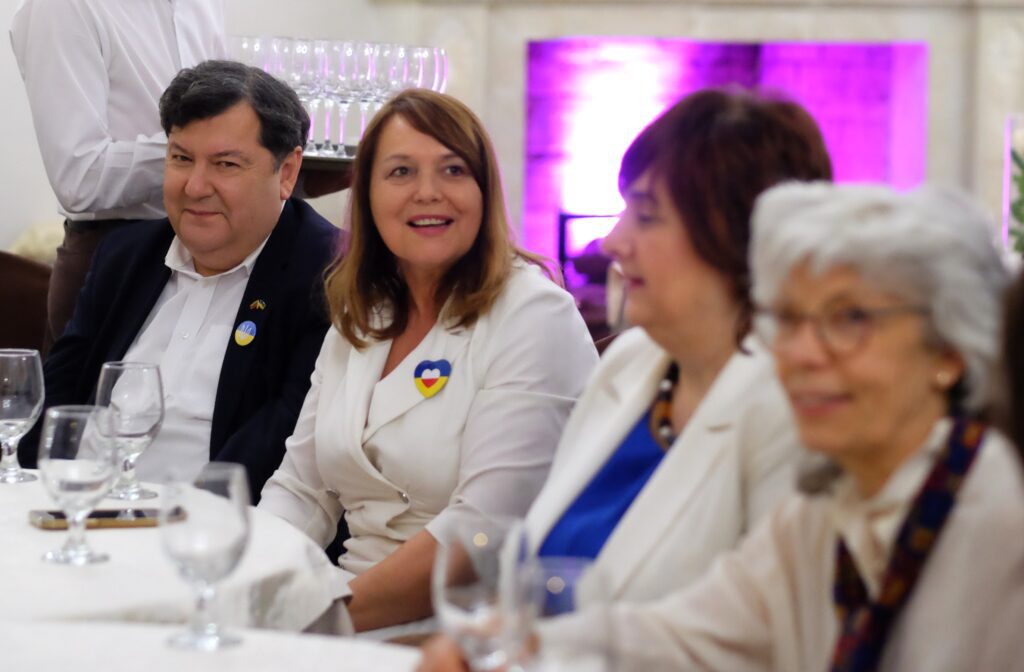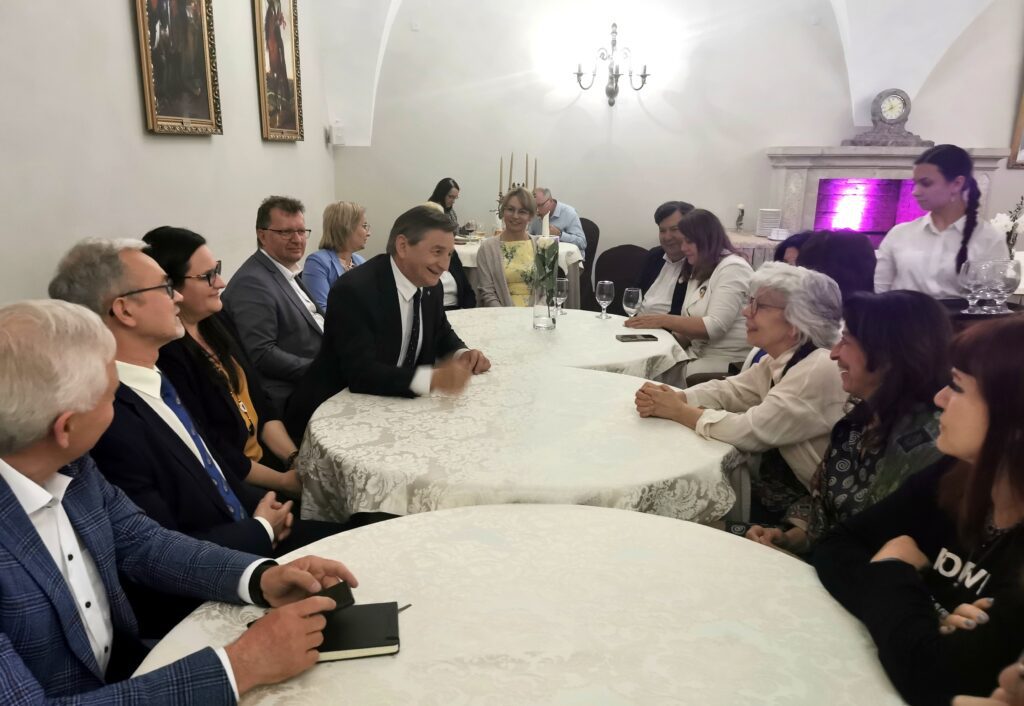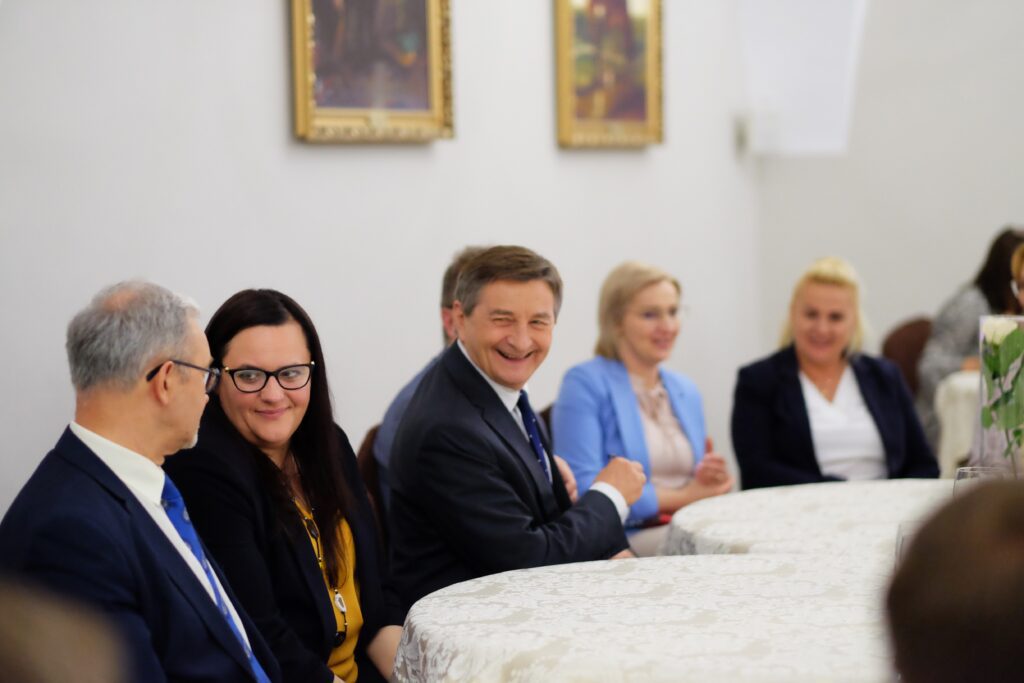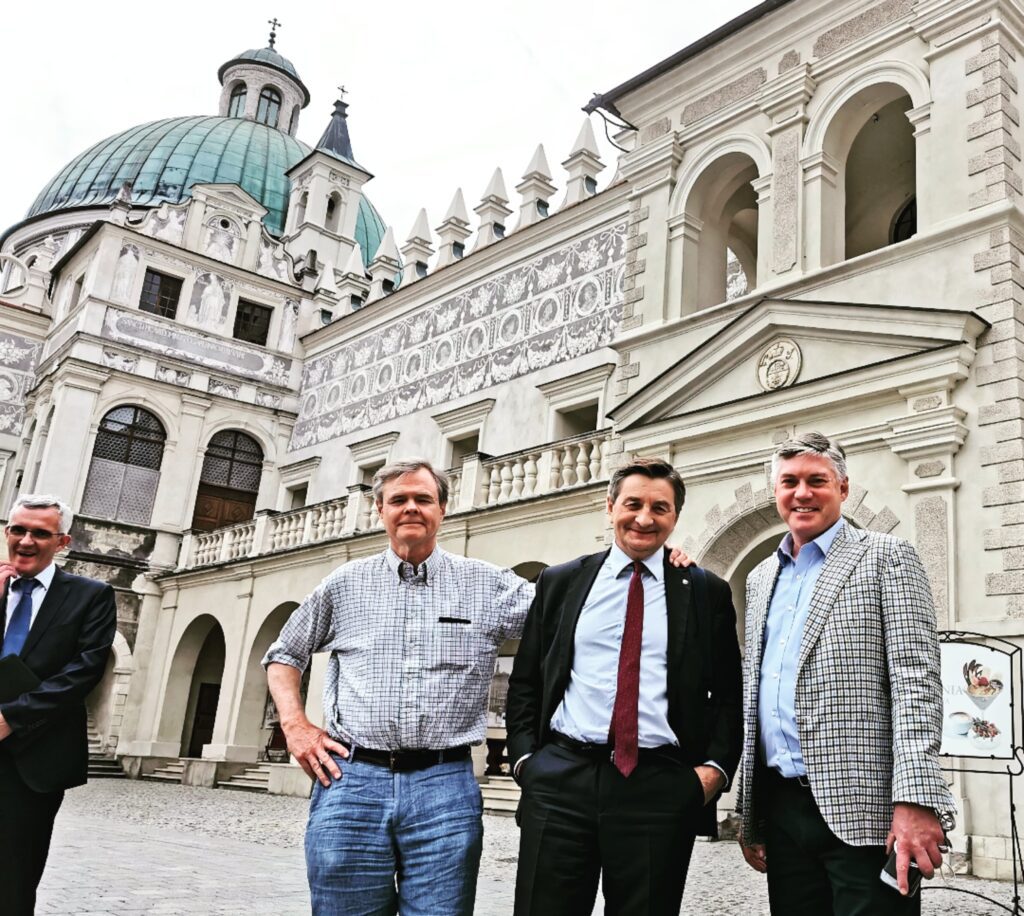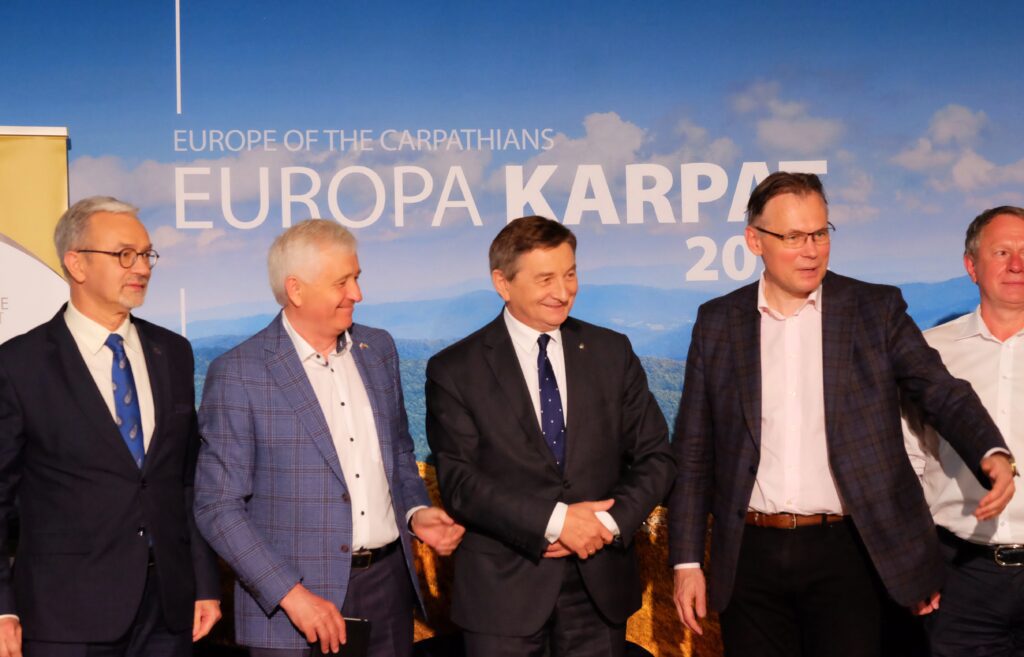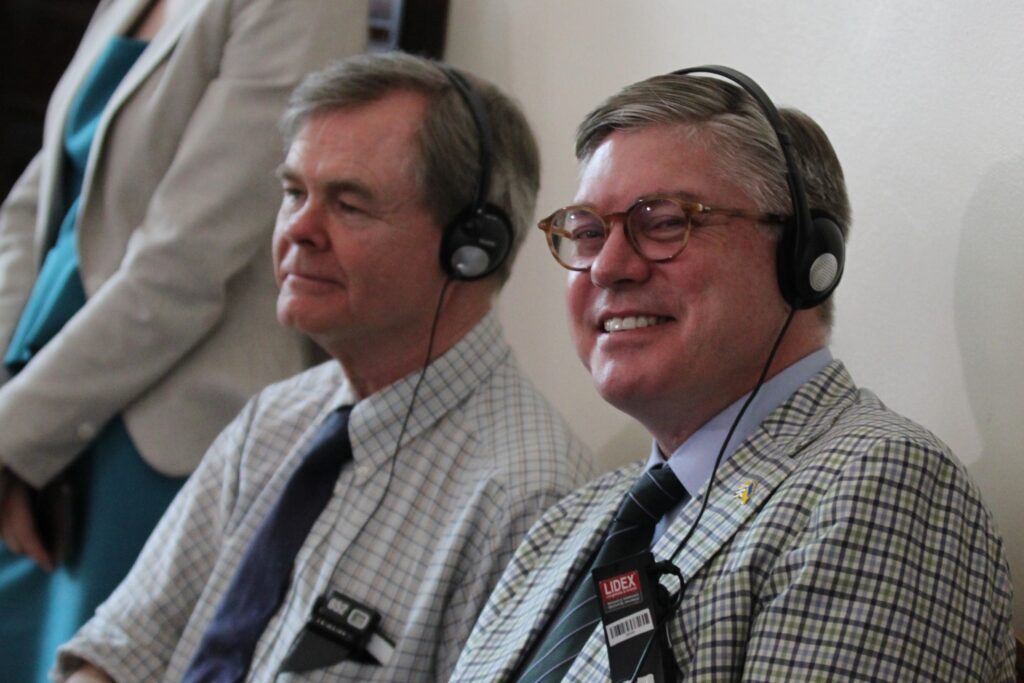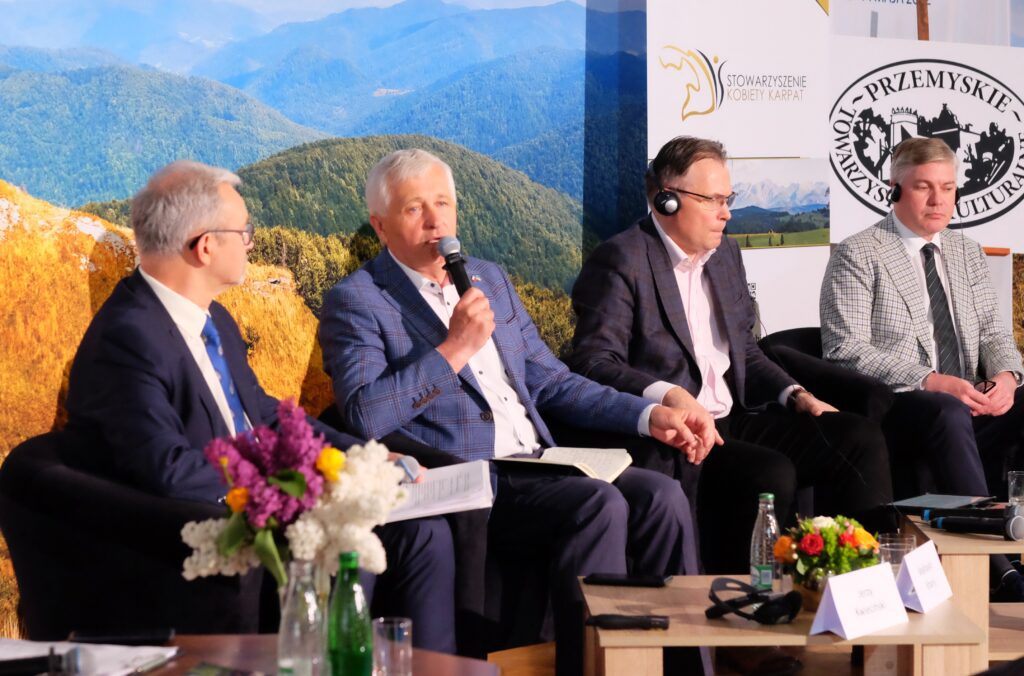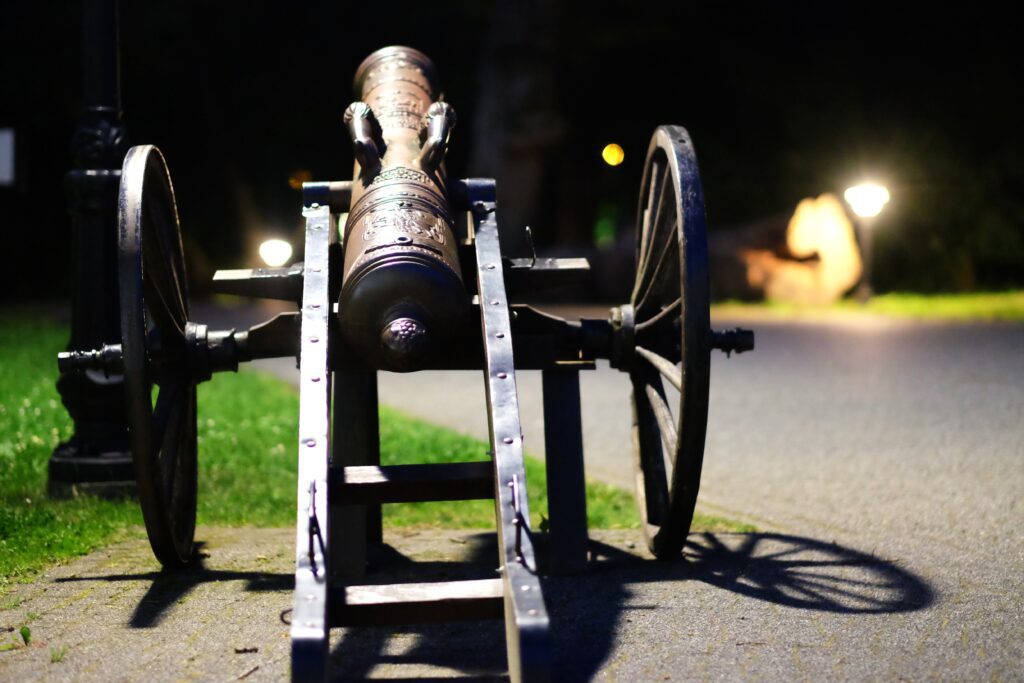On May 13-14, Krasiczyn in Podkarpacie region hosted the 33rd edition of the international conference Carpathian Europe. The conference was attended by members of parliament, local government, and academics from the Carpathian region, Poland, Ukraine, Slovakia, Czech Republic, Lithuania, Hungary, Romania, Moldova, as well as Sweden, Greece, Great Britain and the United States. Conference participants discussed, among other topics, the war in Ukraine and the transformation and reconstruction of this country, the development of communication in Central Europe and the Strategic Investment Program. The meeting was co-organized by the Chancellery of the Sejm, the Chancellery of the Prime Minister, the Przemyśl Cultural Association, and the Wacław Felczak Institute for Polish-Hungarian Cooperation. The conference was accompanied by two exhibitions displayed in the halls of the Krasiczyński Castle and a presentation of the results of the international competition and the winners of the Digital Carpathian Europe organized in cooperation with the Chancellery of the Prime Minister.
After the end of the first day of the conference a meeting of the Clubs of Carpathian Europe was held, which discussed the program of activities and elected the presidium consisting of: Marek Kuchciński - chairman, members: from Poland: Barbara Bartuś, Jerzy Kwieciński, Władysław Ortyl, Maciej Szymanowski, from Slovakia: Jan Hudacki, Pavol Macala, from Ukraine: Mikhaylo Kharyi, Markijan Malski, from Hungary Richard Horcsik.
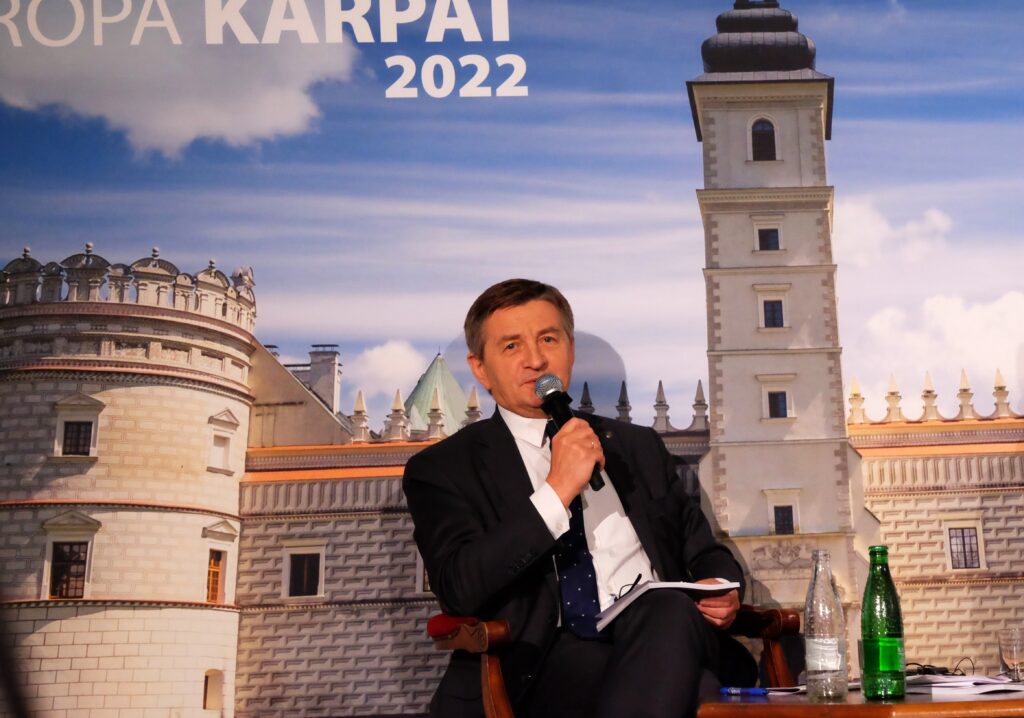
The conference opened with an address by the Chairman of the Foreign Affairs Committee, former Speaker of the Sejm, Marek Kuchciński. - We are meeting in a special situation. This conference was supposed to take place in Ukraine, in Yaremcha, in the Eastern Carpathians, but the war has thwarted these intentions. Although we live in Central Europe, we know that it is still divided by borders. Not far from here we have the border of the European Union. We, Hungary, Slovakia, the Czech Republic, the Baltic States, Romania, Bulgaria, got out from under Moscow's orbit, but others remain there. You can see how important it is after Ukraine - said Marek Kuchciński in his inauguration speech.
- We have been building our state in peace, consolidating sovereignty in intra-EU disputes, but there is a war in Ukraine. Hence, our conference is largely devoted to the events in Ukraine and all the consequences. We will also talk about the transformation, reconstruction of Ukraine, but also about the Carpathian diversity, civilization routes. Diversity, which brings not only natural wealth, but also the wealth of people," he stressed.
Igor Tsependa, rector of the Transcarpathian National University, symbolically opened the conference - Unfortunately, we were not able to hold the conference in Yaremcha this year due to the Russian aggression. Unfortunately, we were not able to hold the conference in Yaremcha this year due to the Russian aggression. At the political level, and most importantly at the interpersonal level, Polish society has shown not only compassion but also fraternal support on a hitherto unseen scale for Ukrainians in need. The struggle continues and presents us with new challenges that we must meet together," said Igor Tsependa.
Carpathian Europe - a land of diversity
The first Friday (13.05) panel was devoted to the significance of particular countries, lands, and regions in building the identity of Central Europe. The role of the Przemyska Land and the Subcarpathian Region in the Europe of the Carpathians was discussed. The panelists discussed, among other things, how in the times of cultural confrontation the Carpathian diversity builds the identity of Central and Eastern Europe.
- The Carpathian region is a place where many cultures meet, many very interesting philosophical and artistic trends. Also, many political and national disputes take place here. At the same time this region is characterized by the diversity of nature. It is, one can say, the heart of Europe. The Carpathians bring nations together. It is still a place where human and international contacts intersect. We need to ensure that, despite various difficult situations, the Carpathians continue to bring people together,' said the chairman of the Parliamentary Commission for Culture and Media, Piotr Babinetz, opening the discussion.
The Hungarian perspective was presented by Nagy Dénes András of the National University of Public Service. - We are driven by a great goal to make this area the best area to live in the EU by the 22nd century. To achieve this we should, among other things, make the Carpathian Europe area the best place to live in Europe by 2050. As a space to live, quality of life and safety. Next year we will celebrate the 20th anniversary of the Carpathian Agreement. We should analyze what we have already achieved and what needs to be realized. We also need to strengthen all opportunities for institutional cooperation. It is worth coordinating cooperation between the Carpathian universities - he pointed out.
Speaking in the discussion, Maciej Szymanowski, director of the Wacław Felczak Institute, drew attention to the common fate of the countries of Carpathian Europe. - Two world wars, the Cold War, the collapse of communism, and the transformation that transformed our societies. All this is common to us," he said. - The second thing is interdependence - in the area of security and values. This is what unites us in the entire EU. The community of nations. We are proud of our nations. We compete, but it is a healthy competition. We are politically mature nations. We are able to cooperate with each other. We do not act as protectorates, but as sovereign states that pursue their national interests - he added.
Carpathians tamed? Civilizational wanderings in Central Europe. Carpathian roads and trails. From the Transcarpathian railroad line via Via Carpathia, Via Kulturalia, to the Crimson Trail
- I treat Carpathian Europe as an extremely important micro-regional project. It has a great value. All participating countries have a benefit from it - said Richard Hörcsik, chairman of the EU Affairs Committee of the Hungarian National Assembly. - For centuries the Carpathians have cut off this part of Europe, and the people of Central Europe in general, from opportunities for development. Because of the closure, Europe was not aware of the values, the accumulated cultural heritage. To open this region we needed several key, including the construction of railroads, infrastructure - he added.
Anna Paluch, Vice-Chairman of the Parliamentary Group for Mountain Rescue, during her speech pointed out that it is communication that decides about development. - Of course, we should not "tame" such beautiful mountains, so as not to deprive them of their beauty, but the duty of a responsible public authority is to make the mountains accessible - she said. - We have accumulated in one mountain range enormous natural values, which are combined with enormous cultural values. This is a cultural melting pot. Our duty is to lead the debate, to create this thread of understanding between parliamentarians of different countries.
- The Carpathian region and other areas of Central, Central-Eastern and Eastern-Southern Europe are full of very concrete and deep ties of coexistence of different ethnic, religious cultures and related identities. We have very deep historical ties even in the face of difficult situations. This has created a tradition of a sense of common destiny, said Grigoris Zarotiadis of Aristotle University of Thessaloniki. - We are responsible for this region in the face of a currently very difficult moment in history. Projects such as Via Carpathia are crucial for the peoples of our region - he pointed out.
The moderator in this part of the meeting was Mr. Władysław Ortyl, the Marshal of the Podkarpackie Province.
Communication development in Central Europe
The panel which started the second day of the meeting (14.05) was an opportunity to discuss the transport and infrastructure situation in the region, also in the context of the ongoing war in Ukraine.
Ministers of infrastructure from Poland, Ukraine, Slovakia, the Czech Republic and Moldova shared their experiences and thoughts.
Infrastructure Minister Andrzej Adamczyk noted that the topic of war has been present in debates, including those taking place during the Carpathian Europe since 2006, when President Lech Kaczyński initiated the realization of a large trans-European project Via Carpatia. - Today everyone points out how necessary this project is. This corridor of the Tri-City Europe is today a fundamental element from the perspective of the defense of the EU and its member states. Our meetings and debates always had this military aspect in the background. We prepared for the possibility of war in the Ministry of Infrastructure, but also with the railroads, earlier. This results now in the context of helping refugees, we help them to get to their destination - he said. - Creating economic prosperity is possible when we are free, and we are free when we are able to defend ourselves. We are able to defend ourselves when we have proper infrastructure, including transport infrastructure - he added.
- We look at this war in the context of a fundamental and unprecedented increase in the price of construction materials. This threatens the continued construction of infrastructure. I hope that together we will help in the reconstruction of Ukraine. That is why we have already started work on a feasibility study to build a freeway to the east, towards the Ukrainian border. This border may soon become crucial for us. We want to develop the infrastructure in the eastern part of our country," stressed Andrej Doležal, Minister of Transport and Construction of Slovakia.
- Russia's attack on the independent state of Ukraine has, in fact, shattered the entire security architecture, not only in the European area, but globally. I would like to emphasize my satisfaction with the tightening of transport cooperation between Poland and Ukraine. This opens up a new platform for trade in goods. The consequences of the Russian attack on Poland-Ukraine relations change a lot. Political support of Poland, the countries of Central and Eastern Europe, supporting efforts of the Ukrainian government define the future of Ukraine as an exceptionally important partner of European institutions, a country aspiring to join the EU - said Jerzy Polaczek, the chairman of the Polish-Slovak Parliamentary Group.
The discussion was moderated by Bogdan Rzonca, Member of the European Parliament.
War in Ukraine
The second Saturday panel at the conference discussed the war in Ukraine. The first to speak in the discussion was Deputy Speaker of the Sejm Ryszard Terlecki. - We are talking about the future. It so happens that more and more plans, proposals concern the period after the war in Ukraine. It is clear that we have to think about it, but this war is ongoing and we do not know what the consequences will be, what the geopolitical situation after the war will be like - Deputy Speaker Terlecki noted. - Ukraine has sent a questionnaire to Brussels on its readiness to join the EU. The answer is expected at the EU summit on June 23. In the meantime, the fast track project proposed by Central European countries, especially Poland, was rejected. It is not so that everyone in Europe has understood that Ukraine should find itself in the EU as soon as possible - lamented Ryszard Terlecki.
- A lot has changed since February 24. Ukrainian-Polish relations have moved to another level. First of all, Poland opened our borders, gave us shelter, and took on great responsibility. This concern comes not only from the government, but from the citizens. Poles accept Ukrainians as their relatives," stressed Deputy Chairwoman of the Verkhovna Rada of Ukraine Oleena Kondratiuk. - We are dealing with a crack in global security. The Russian Federation is conducting a planned policy of genocide of the Ukrainian people. Since 2014, many European countries have pursued a policy of creating peace. These were such games. Poland and the Baltic States, on the other hand, present a firm stance," Olena Kondratiuk noted.
The session was chaired by Przemysław Żurawski vel Grajewski, lecturer at the Diplomatic Academy of the Ministry of Foreign Affairs and permanent advisor to the Sejm Foreign Affairs Committee.
Collegium Carpathicum - what future?
In this part of the meeting, the idea of cooperation of Central European universities from the V4 countries, Romania and Ukraine within the Collegium Carpathicum was discussed.
The idea of the Carpathian University was presented by Markiyan Malskyy of Lviv University. - The Carpathian region is not only a region of nature, economy and culture, but also a region of intellect. Therefore, the creation of such an institution seems obvious. However, we cannot create a traditional institute, we must create it in a dynamic, modern, virtual way, according to the latest methods. The next step is also institutionalization, organization of cyclic conferences, student exchange, implementation of cyclic projects - said Prof. Malskyy.
Wojciech Bakun, the President of Przemyśl, emphasizing the full support of the city for the idea of the Carpathian University, noted that looking from the perspective of the war crisis, quick actions should be taken. - They cannot only aim at creating the university, as it is a long-term process. We already have to think what to do next. We have to think what about the educational process in the context of rebuilding Ukraine. All those who flee Ukraine must develop pro-Western, pro-European thinking. Teaching pro-European thinking and the culture of democracy is also one of the biggest tasks to be performed by the international community", said Wojciech Bakun.
The discussion was moderated by Prof. Jan Malicki, Director of the Eastern European Studies at Warsaw University.
European Resources for Development in Central Europe - Scope of Funding Measures
- It is not so easy to invest European funds well. Poland has been exercising the use of European funds since 2004. Then we had such a first financial perspective 2004-2006. We could check how we manage to spend and implement the funds we have at our disposal. During the next perspective 2007-2013 regions were involved at the level of self-governments, voivodeships. We are in the midst of the 2014-2020 perspective and we stand at the threshold of a new one - mentioned Małgorzata Jarosińska-Jedynak, Secretary of State in the Ministry of Funds and Regional Policy. - We still have many instruments, such as Interreg programmes, which Poland uses very actively. We want to implement joint actions that will allow to build a good, stable entrepreneurship, which will both realize the construction of the new state of Ukraine and at the same time will affect the increase in the competitiveness of the Polish economy - added Deputy Minister Jarosińska-Jedynak.
Ruslan Kulyk, director of the Department of International Cooperation and Promotion of Ternopil Regional Council, emphasized that for Ukraine the subject of energy is the most important. - We can jointly obtain European funds. Speaking about the reconstruction of Ukraine, we are talking not only about the reconstruction of infrastructure, but also about reforms. The war brought them to a standstill. If we want to end the war, we should talk about the energy sector, so that it is not dependent on one country - he emphasized.
The discussion was moderated by Dawid Lasek, Vice President of the Carpathian Euroregion Association.
Women of the Carpathians. The great role of women in contemporary Europe
- The longer it sticks in the consciousness of Europeans that the war can come to any of us, that this war is all of Europe, we will be able to project this image beyond the borders of Poland, the better the chances of ending maybe not the whole war, but the stage we are at. This is not Putin's war, but the war of Russian society. We should try to reach Russian women in a soft way. The action "Stop the war in Ukraine" was initiated by the first lady Agata Kornhauser-Duda. It is women who have the skills to convince different circles. We are all also worried about how the economy will look like, what will happen in individual countries, how the raw materials policy will look like - said during the women's debate Olga Semeniuk, Secretary of State at the Ministry of Development and Technology.
In turn, MP Teresa Pamuła noted that on February 24 we all passed the test as citizens and as a country. - Each of us has a different task to fulfill, but each of us in addition to what is the main purpose of her action, work, we are prepared for emergencies. We are able to divide our time to perform many duties. Women from Ukraine came here to Poland and met wonderful women, wonderful people and great tolerance. However, we cannot get used to war. It is our role to convince other nations, to reach their hearts, to talk about evil and show the cruelty of war - she emphasized.
The perspective of a woman from war-torn Ukraine was presented by Olena Kopanchuk, MP, Deputy Chair of the Budget Committee of the Verkhovna Rada of Ukraine. - It is crucial to understand what a Ukrainian woman expects now, what her role in the EU will be and why the war happened. We always said that the war has been going on for 8 years, that sanctions should be strengthened. We understood that an aggressor does not allow a peaceful country to develop. We wanted to live in a free country, have our own way of development, for several years we showed how we can develop. This was very inconvenient for the Russian Federation, which did not want to have a free state nearby. They want to develop under dictatorial conditions. Ukraine is different. Historically, mentally, geographically we are Europeans because the center of Europe is in the Carpathians and right now we are defending the whole democratic world," she stressed.
The moderator of the discussion at this point of the conference was Nelly Rokita from the Carpathian Women's Association.
Transformation and Reconstruction of Ukraine - program presentation
Arkadiusz Mularczyk, MP from the Parliamentary Foreign Affairs Committee, pointed to the very important element of including parliamentary diplomacy in the process of putting pressure on governments, ministers. - The program of transformation of Ukraine is being created. An important issue here is the use of frozen Russian currency. They should be confiscated and used for reconstruction. Also the funds of the oligarchs should be used for reconstruction. The second element is that the countries, which are now engaged in helping Ukraine, should have a proportional share in its reconstruction - he assessed.
Mychajło Panoczko, bishop of the Evangelical Church, emphasized that Poland is "the closest partner and friend of Ukraine. - We are grateful for humanitarian, spiritual, political and military support. The war brought our nations closer. Ukraine is in one of the most difficult stages in its history. We are going through a very painful process. I believe that it will accelerate the transformation. The Polish experience is very important for us - he emphasized. - Changing the worldview, the ideological thinking from eastern Ukraine is not easy. We want to change their thinking. Kindness gives us a chance to change their way of thinking. This is the beginning of the transformation. The process continues and we are supported by millions of people around the world - added Bishop Panoczko.
Mykhaylo Khariy of the Ukrainian Center for Transformation Ukraine stated that the Western world has joined together to help Ukraine. - We are getting modern equipment. We have diplomatic and humanitarian support. Ukraine's goal is to win and become part of the international community. I am sure that we will win. We must work on a common vision and build a global Ukrainian project. Our priority is to develop a vision, a plan for the transformation of Ukraine. We see it as a joint project of Ukraine and the West," he noted.
The discussion in this part of the conference was led by Jerzy Kwieciński, Vice President of the Management Board of Bank Pekao S.A.
During the 33rd Carpathian Europe Conference the participants also discussed the Strategic Investment Program, the governmental Road Development Fund and changes in the tax system. The discussion was attended by Chairman of the Parliamentary Foreign Affairs Committee Marek Kuchciński, Vice Marshal of the Podkarpackie Region Piotr Pilch, Secretary of State at the Ministry of Infrastructure Rafał Weber, Secretary of State at the Ministry of Finance Artur Soboń, Secretary of State at the Ministry of Finance Piotr Patkowski, as well as local government officials from Southeast Poland.
Events accompanying the 33rd Carpathian Europe included the presentation of the digital International Competition for Comics "Legends of the Podkarpacie Region" organized by the Chancellery of the Prime Minister and the Sejm of the Republic of Poland, and the opening of the exhibition "Ukraine through my eyes" International Painting Triennial of the Carpathian Region - Silver Quadrilateral 2021 under the honorary patronage of President Andrzej Duda.
During the conference flowers were also laid under the Adam oak tree to commemorate the 155th birthday anniversary of Cardinal Adam Stefan Sapieha. The ceremony was attended by the Deputy Speaker of the Sejm Ryszard Terlecki and the originator and initiator of the Carpathian Europe, the Chairman of the Foreign Affairs Committee Marek Kuchciński.
During the two-day meeting in Krasiczyn the Parliament was also represented by Christian Młynarek, Deputy Head of the Chancellery of the Sejm.
text: CIS
Photo by Marta Olejnik
